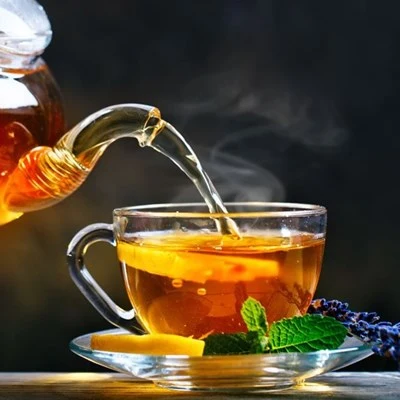Greetings Dramastrags 
Today I want to regale you with a tale about International Drama involving the evils of the 


 Exploiting poor Afrikans, AGAAAAAAAAAAAAAIN
Exploiting poor Afrikans, AGAAAAAAAAAAAAAIN 
But 1st
WHAT IS ROOIBOS TEE:
https://www.klipopmekaar.co.za/rooibos-tea-history/
RooiBos tea is the red-amber tea harvested from the indigenous RedBush plant growing in the Western parts of South Africa - especially in the Western Cape and Northern Cape Provinces.
The name rooibos is derived from Afrikaans and directly translates to “red bush”, and this refers to the mature rooibos plant's rich red-brown leaves at the end of a hot summer in its native range.
https://www.nationalgeographic.com/travel/article/on-the-trail-of-south-africas-miracle-tea
Similar to Biltong, which was adopted by dutch settlers of the Cape colony mimicking the Khoisan tribes utilizing dry & sealed cool clay or walled huts to cure meat into dried emergency foods, so too had the dutch/proto-boers mimicked the Khoisan in their behaviour of utilizing all available edible plants to create foods or drinks able to be safely consumed by man.
Starting as long as 300 years ago, at some unknown point in the 1700s, the dutch would replicate the Khoisan mixing Redbush with water to make flavoured drinks, but instead make tea with it - by boiling the Rooibos leaves with hot water to especially excavate the flavour from the leaves, compared to just mixing it with cold water.
Rooibos would especially be adopted as a popular variant of local tea by europeans, when the Cape Colony switched hands from the dutch to the British after a battle in January 1806 on the shores of Table Bay, when the Dutch garrison of Cape Castle surrendered to the British. And even as much as 200 years ago the British were stereotyped to be obsessed with tea of all kinds, and would consume tea multiple times a day. This had a knock-on cross-cultural effect. The dutch had learned of the existence of the Rooibos plant by observing the local Khoisan, and had adapted it as a hot-boiled drink instead of a cold drink instead, when the British came into contact with the local dutch refreshment farmers, they much more avidly adopted the Rooibos tea as a daily drink. Even more funnily was however that the British in turn would introduce the dutch already living in the Cape Colony to avid tea-drinking culture.
Before 1806, the dutch would drink Rooibos, but only seldom - MAYBE once a day for every 3rd dutchman. The british however, by this time had already established the culture of drinking tea of all kinds, as much as at least 3 times per day, and had experimented with various formulas of mixing sugar and milk with their tea.
Thus in a strange sense, it would be the british settlers and military garrison to actually popularize the massed tea consumption culture of Rooibos tea (as well as other preferred tea plants imported from places like China) back onto the majority dutch living in the Cape, even though the dutch were the ones to expose the Brits to the existence of the local Rooibos.
But actually farming the Rooibos tea leaves from the plant on an industrial and commercial scale, instead of just foraging existing plants, or the odd dutch farmer using subsistence vegetable garden farming, would not start until the 1900s, about a hundred years later.
It would go on to become the most popular brand of tea in the country for over 110 years, and one of the greater agricultural exports of South Africa.
https://sarooibos.co.za/rooibos-loved-the-world-over/
YANKS DISCOVER ROOIBOS TEA:
https://sarooibos.co.za/rooibos-loved-the-world-over/
USA TRADEMARK CONTROVESY:
Way back in 1994, Rooibos was virtually unknown in the wider international community, both because everything Africa related had no international product presence; but more significantly because of the Anti-Apartheid sanctions imposed upon the Union of South Africa for almost 20 years (by Burgerland and other European liberal democracies) by this point, so that by the time 1994 had arrived, it meant that Rooibos had mostly become a product produced for local consumption.
And while Rooibos tea had been exported internationally from South Africa since as early as the 1930s on large scale, this was obviously darned into obscurity by Anti-Apartheid Sanctions, to make Rooibos exports whittle down to nothing by the time the 1980s arrived in South Africa. Which means that for almost 25 years, sanctions had made Rooibos tea fall into complete obscurity despite the tea having been relatively famous for its small brand exportation in terms of the small scale, compared to the absolutely monumental scale of tea-exporting titans like China.
And thus, because Rooibos was so virtually unknown in 1994, a Burgerland company known as The Burke Group, would register the name "Rooibos" with the US Patent and Trademark Office and so established a monopoly on the name in the United States when the plant was virtually unknown there.
These frickers would get away with this for almost 11 years. And as the South African Rooibos tea industry slowly and incrementally regained its size and previous pre-Apartheid era international scale and fame, the knowledge that some yank company had tried to internationally patent the Rooibos tea brand, soon became known to South African farmers and politicians.
When south African farmers and export companies tried to export Rooibos to Western markets like America, Burke Group demanded for companies to pay fees to use the name or to cease its use. This would begin a year long international diplomatic incident between  and
and 
Things came to a head when In 2005, the American Herbal Products Association and a number of import companies succeeded in defeating the trademark through petitions and lawsuits. After losing one of the cases, Burke surrendered the name to the public domain.
https://web.archive.org/web/20141221105710/http://ahpa.org/Default.aspx?tabid=145&aId=216
=====(from waybackmachine article)
Rooibos Trademark Abandoned
Silver Spring, MD (June 27, 2005) — In a satisfying conclusion to attempts by the American Herbal Products Association (AHPA) and others to challenge the legitimacy of a trademark for the name "rooibos," AHPA has been notified that the owner of the trademark has informed the US Patent and Trademark Office (USPTO) that it has "voluntarily surrender[ed]" the mark.
"This outcome represents an important precedent," stated Michael McGuffin, AHPA's president. "AHPA will continue to be vigilant in preventing any individual company from claiming the sole right to use an established common name for any plant in commerce." 




Although rooibos is the standard common name for the South African plant Aspalathus linearis, a US trademark for the word "rooibos" was registered in 1994. The owner of the mark, Burke International, sought to protect the trademark by claiming that labels that correctly identified Aspalathus linearis as rooibos were infringing on their trade name. 






Petitions to USPTO to force a cancellation of the trademark were undertaken by AHPA and by Rooibos, Ltd., a South African exporter of the herb. In addition, a lawsuit brought by The Republic of Tea against Burke was resolved in January 2005 with a US District Court decision that the trademark was invalid and should be cancelled. Burke's notice of voluntary surrender was dated June 24, 2005, and was served on that date to AHPA's counsel.
=====(end quote)
CULTURAL CONTROVESY IN SA:
Oh yes, it caused an immense stir in South Africa, because many SA peeps were angry that the Rooibos industry farmers had slept on their hands, and allowed a foreign fricking nation to steal a national agricultural trademark from beneath their feet. Even more, for as long as since 2001, many civilians were outraged that some Burgerland company was abusing international trademark law to claim Rooibos was to be utilized as an American-protected trademark, which incensed South Africans, especially coloureds and descendants of Khoisan, whom not only made the majority of workforces in Rooibos farms located in places like Wuppertal and Clanwilliam (the two most prominent cities in which Rooibos tea leaves are farmed and processed), but also because Cape coloureds are immensely proud of the fact Rooibos are a South African, and especially a coloured Khoisan discovery, and had long standing claims over it being a distinct part of their cultural herritage.
Even during the days of High Apartheid, no Afrikaner ever laid claim that Rooibos tea was a European discovery, only that Boers were the ones inventing the industrialized farming process of Rooibos tea, and was only to glad to lay the credit of discovery at the hands of the Khoisan.
Thus, a white company from a white nation like Burgerland (by the standards of South Africa) laying claim to trademark of Rooibos tea, caused a massive sneedstorm in South African news where everyone was mad at everyone for letting this catastrophe take place. However, famously the ruling government was not at its most competent at this stage, between the years of 2001-2005, and despite implorements to politicians to take this matter to the international court or some such shit, having an international-trademark dispute wasn't high on the priority list for our ANC overlords.
Thus it was a matter of great r-sluration and hilarity that it took another Burgerland organization, to fricking take the fight against The Burke Group, on behalf of the inept South African government, or rather the AHPA (American Herbal Products Association - the national trade association and voice of the herbal supplement industry) did it on behalf of their American consumers, rather than on behalf of the Safricans lmoa 


 and to thus break the monopoly which The Burke Group had upon the Rooibos name trademark in America, the most lucrative single market nation for the Rooibos industry.
and to thus break the monopoly which The Burke Group had upon the Rooibos name trademark in America, the most lucrative single market nation for the Rooibos industry.
RSA FINALLY TRADEMARKS ROOIBOS TEA:
Finally getting its butt into gear, it took the SA government until 6 September 2013, for the Department of Trade and Industry to issue rules which protects and restricts the use of the names "rooibos", "red bush", "rooibostee", "rooibos tea", "rooitee", and "rooibosch" in the country so that the name cannot be used for things unless they are derived from the Aspalathus linearis plant (the RedBush plant species).
=====(from article)
Although long and costly, the IP dispute surrounding the registration of rooibos as a trademark in the United States of America (USA) brought international attention not only to the unique properties of the plant, but also its link to the culture of the people in the Cederberg region and South Africa. This motivated the industry to unite around a common cause for the protection of rooibos, and finally, in 2014, rooibos received status as the first geographical indication (GI) for a South African product other than wine and spirits.
====(end quote)
"Rooibos meets all of the requirements for GI protection, as defined in the World Trade Organization (WTO) Agreement on the Trade-Related Aspects of Intellectual Property Rights (TRIPS Agreement): it is only grown in one part of the world and the properties of the plant are a direct result of the unique geographical conditions in which it grows. Furthermore, the knowledge of the rooibos plant and the cultivation expertise is unique to South Africa, as it only occurs here. The plant is truly part of South African identity, and in 2008, the Minister of Trade and Industry recognized the importance of protecting South African GIs, such as rooibos, and submitted the Intellectual Property Laws Amendment Bill to parliament."
"After eight years of intensive research and lobbying by the industry in South Africa, rooibos was able to achieve status of a GI, which will ultimately promote further economic growth and competitiveness, especially in the international market. The final push for domestic GI protection came in the form of a reciprocal agreement between South Africa and the European Union (EU), as part of the comprehensive Southern African Development Community Economic Partnership Agreement (SADC EPA). This means that only rooibos tea producers and processors from South Africa will be able to use the term rooibos in relation to products that come from the designated geographical area. It is expected that the move to protecting rooibos as a GI in South Africa will help lay the foundation for the protection of future products with certain qualities or characteristics from a specific geographical area in South Africa. Presently, GI protection for products other than wines and spirits has been secured for rooibos tea, honeybush tea, and Karoo lamb meat."
https://www.theguardian.com/world/2014/jul/28/rooibos-tea-trademark-awarded-south-africa-deal-eu
https://www.ibtimes.com/safricas-rooibos-tea-joins-champagne-eu-protection-list-3221555
====(from ibtimes article)
Like champagne, roquefort and Kalamata olives, South Africa's world-famous rooibos tea has been added to a European Union list of protected agricultural products and foodstuffs, an industry official said Wednesday.
The protected designation of origin (PDO) status, assigned to the tea or "red bush" late last month, means only leaves cultivated in South Africa's southeast Cederberg region can be sold as "rooibos" in EU countries and several others outside the bloc.
The PDO status -- meant to protect the name and authenticity of unique geographically-linked products -- will allow producers to limit competition from a growing range of non-genuine rooibos teas that have appeared amid rising demand for the caffeine free, antioxidant-rich brew.
=====(end quote)




























Jump in the discussion.
No email address required.
Yeah rude boys are cool.
Jump in the discussion.
No email address required.
More options
Context